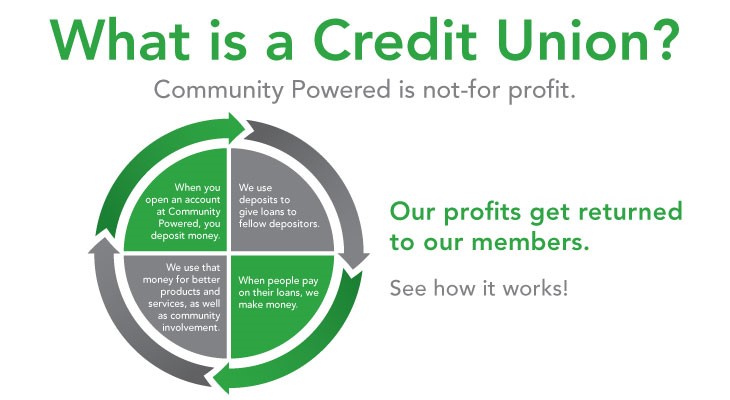Wyoming Credit: Your Regional Resource for Financial Safety and Development
Wyoming Credit: Your Regional Resource for Financial Safety and Development
Blog Article
Opening the Perks of Lending Institution: Your Guide
In the world of economic institutions, cooperative credit union stand as a usually underexplored and distinct alternative for those seeking an extra customized approach to banking. As we explore the details of lending institution, a world of possibilities and advantages unfolds, using a peek right into a financial landscape where community values and member-focused services take center stage. From their humble starts to their modern influence, comprehending the significance of lending institution can potentially improve the means you watch and handle your funds.

Background of Credit Report Unions
Cooperative credit union have a rich history rooted in the participating motion, dating back to the 19th century. The principle of cooperative credit union became a reaction to the economic demands of individuals that were underserved by conventional banks. Friedrich Wilhelm Raiffeisen, a German mayor, is frequently credited with establishing the initial modern cooperative credit union in the mid-1800s (Credit Union in Cheyenne Wyoming). Raiffeisen developed participating loaning societies to aid farmers and country communities gain access to economical credit score and escape the clutches of usurious loan providers.
The concept of people integrating to merge their resources and supply financial help to each various other spread swiftly across Europe and later on to North America. In 1909, the initial credit history union in the United States was developed in New Hampshire, noting the beginning of a brand-new era in community-focused banking. Ever since, lending institution have actually proceeded to focus on the financial health of their participants over revenue, symbolizing the participating concepts of self-help, self-responsibility, freedom, equity, equal rights, and uniformity.
Subscription Qualification Criteria
Having actually developed a foundation rooted in cooperative principles and community-focused financial, cooperative credit union maintain certain subscription qualification requirements to guarantee positioning with their core worths and goals. These requirements frequently revolve around an usual bond shared by potential members, which can consist of variables such as geographic location, company, organizational affiliation, or subscription in a certain neighborhood or organization. By requiring participants to meet certain eligibility requirements, lending institution intend to promote a sense of belonging and shared function amongst their participants, strengthening the cooperative nature of these banks.
Along with usual bonds, some cooperative credit union may also expand membership qualification to relative of present members or people that reside in the very same house. This inclusivity aids credit scores unions expand their reach while still staying real to their community-oriented principles. By preserving clear and transparent subscription standards, credit unions can ensure that their participants are actively participated in sustaining the cooperative worths and objectives of the organization.
Financial Products and Providers
When thinking about the array of offerings readily available, cooperative credit union provide a varied array of economic product or services tailored to satisfy the one-of-a-kind requirements of their members. These offerings usually consist of savings and checking accounts, financings (such as car fundings, personal financings, and mortgages), bank card, and various investment choices. One key benefit of cooperative credit union is their emphasis on supplying affordable interest rates and reduced costs compared to traditional financial institutions. Participants frequently benefit from individualized customer care, as credit scores unions focus on building solid partnerships with those they offer.
In addition, lending institution frequently provide financial education and learning and therapy to assist members enhance their monetary literacy and make notified decisions. Numerous cooperative credit union likewise take part in shared branching networks, enabling participants to access their accounts at a range of places across the country. In general, the series of economic services and products supplied by cooperative credit union underscores their commitment to fulfilling the diverse requirements of their members while prioritizing their financial health.

Benefits Over Traditional Banks
Showing a distinct method to monetary solutions, read review lending institution offer several advantages over traditional banks. One key advantage is that credit history unions are normally member-owned, suggesting that profits are reinvested right into the company to offer better rates and lower charges for participants. This participating framework typically leads to more personalized customer care, as credit scores unions prioritize member fulfillment over making best use of earnings. Additionally, cooperative credit union are understood for their competitive rates of interest on financial savings accounts, fundings, and charge card. This can result in greater returns for participants that save or obtain cash with the lending institution contrasted to traditional financial institutions.
In addition, credit score unions have a tendency to have a solid emphasis on monetary education and learning and community assistance. They commonly provide workshops and sources to assist participants boost a knockout post their economic literacy and make sound finance decisions (Wyoming Credit). By fostering a sense of neighborhood and shared objectives, credit scores unions can create a much more comprehensive and supportive financial atmosphere for their members
Community Participation and Social Influence

Furthermore, credit report unions commonly partner with regional companies and charities to support different social reasons such as budget friendly housing, education and learning, and medical care. By collaborating with these entities, debt unions can amplify their social effect and address important concerns influencing their communities. This collaborative method not only benefits those in demand yet also reinforces the social material of the area by cultivating a sense of unity and assistance amongst its participants. Essentially, credit history unions act as stimulants for favorable change, driving community development and social progress through their energetic participation and impactful efforts.
Conclusion
To conclude, credit rating unions have an abundant background rooted in neighborhood and participation, using a diverse range of economic products and solutions with affordable rates and individualized consumer service. They focus on the monetary well-being of their participants over revenue, fostering a feeling of belonging and supplying financial education and learning. By proactively taking part in social influence campaigns, lending institution produce a supportive and comprehensive banking atmosphere that makes a positive difference in both individual lives and communities.
Friedrich Wilhelm Raiffeisen, a German mayor, is often attributed with starting the very first contemporary credit rating union in the mid-1800s - Credit Union in Cheyenne informative post Wyoming. By requiring members to satisfy particular eligibility needs, debt unions aim to cultivate a sense of belonging and shared purpose among their participants, enhancing the cooperative nature of these monetary institutions
Furthermore, credit report unions frequently use financial education and learning and therapy to help members improve their financial literacy and make notified choices. Generally, the array of economic items and services used by credit rating unions emphasizes their dedication to fulfilling the varied demands of their members while prioritizing their economic health.
Additionally, credit scores unions are known for their competitive interest rates on financial savings accounts, fundings, and credit cards.
Report this page